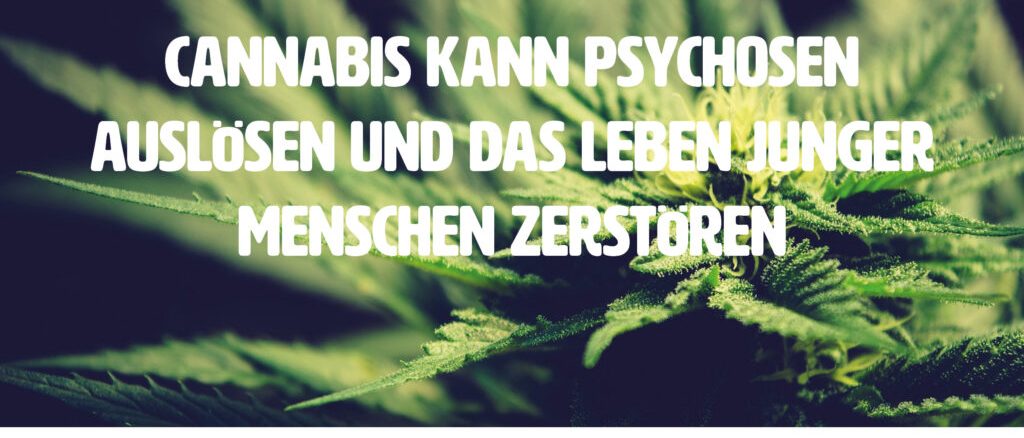
Associations of relatives of mentally ill people
warn of consequences of cannabis legalization:
Cannabis can cause psychosis and destroy the lives of young people!
Joint position paper
of the regional associations of relatives of mentally ill people
Baden-Württemberg, Bavaria, Hamburg, North Rhine-Westphalia
and the Brandenburg State Working Group of Relatives of Psychiatrists
on the legalization of cannabis in Germany
Intensive use of cannabis poses high risks to mental health. Children, adolescents and young adults in particular are at risk of developing psychoses. In quite a few cases, irreversible. Therefore, an alliance of state associations of relatives of mentally ill people would like to point out the serious dangers of a possible cannabis legalization with this position paper and call on the political decision-makers to concretely protect vulnerable groups of our society from these dangers.
Intense and early cannabis use poses many health risks. One of the worst possible consequences is the development of psychosis – a mental illness that is often chronic or occurs in episodes and is associated with hallucinations and delusions, among other things. The risk of developing psychosis from cannabis use is increased by 2 – 3.4 times1. Figures from a new study2 also suggested that one-fifth of cases of schizophrenia3 associated with psychotic symptoms in young men could have been prevented by preventing cannabis use disorder. The amount of active ingredient (THC) is also crucial – the higher the active ingredient content4, the higher the risk of psychosis. Many experts and specialists5 assume that the number of illnesses will again increase significantly after the legalization of cannabis and also warn of other health consequences such as increased dependence.
Psychosis is not a “common cold
Despite the knowledge of these and many other alarming figures, the legalization efforts on the part of the federal government continue to be pushed forward. “One would almost like to think that politics and society are approvingly accepting the “victims” of this project!”, says Karl Heinz Möhrmann, board member of the Bavarian Association of Relatives of Mentally Ill People e. V. (ApK Bayern) and an experienced relative himself. “Many young people underestimate the life-changing consequences of cannabis use. They believe that a psychosis will go away, like a cold. But this is not so!” emphasizes Möhrmann. “Two-thirds of the psychoses that occur either run in relapses or become chronic! Young people who are still healthy are robbed of a large part of their independence and development opportunities. They live with their families or in special institutions, sometimes having to take medication for the rest of their lives. For those affected and for their relatives, this is often a severe break in their own life plans. You wouldn’t wish that on anyone,” Möhrmann adds.
Loss of cognitive abilities up to mental disability
Young people often become ill between mid-puberty and their mid-30s, with the peak of the disease occurring around the age of 206, an age at which, according to current cannabis legalization plans, it will be possible to have unrestricted access to cannabis. At the same time, the brain is not fully developed at this point, which can lead to persistent brain dysfunction when cannabis is used7. “Tragically, most psychotic disorders are in any case based on a delay in brain maturation, which contributes to the well-known information processing disorders with a development of delusions and hallucinations. Since those affected by this initially experience a certain relaxation thanks to the initial calming effect of THC, they would be doubly endangered if cannabis were more easily accessible,” Prof. Dr. med. Josef Bäuml from the Department of Psychiatry and Psychotherapy at the Klinikum rechts der Isar of the Technical University of Munich points out. Dr. med. Tatjana Tafese, pediatrician and psychotherapist as well as member of the board of directors of the Angehörigen psychisch erkrankter Menschen Landesverband Hamburg e. V. (LApK Hamburg). (LApK Hamburg), is concerned about the many possible harms of cannabis use in young people and refers to the results of the recent conference of the DZSKJ (German Center for Addiction Issues in Childhood and Adolescence) in Hamburg: “In addition to the sometimes life-destroying serious mental illnesses, the loss of cognitive abilities is also extremely worrying. This can lead to a loss of intelligence and even to learning disabilities and mental retardation! At a time when more and more young people leave school without graduating, this must be prevented at all costs!”.
Also, cannabis is already widely used without being freely available. A common argument used by cannabis advocates is that legalizing cannabis could dry up the black market. However, the UN Drug Control Council’s 20228 annual report showed that the cannabis black market remains high in all legalizing countries, reaching 40 percent in Canada, nearly 50 percent in Uruguay and as high as 75 percent in California. Although the federal government would like to accompany a possible cannabis legalization of prevention and education programs. However, similar campaigns for alcohol and cigarettes have not succeeded in reducing their consumption, especially by children and young people. On the contrary, results of a survey9 from December 2022 show that the number of 14- to 17-year-olds smoking has almost doubled in one year, even though tobacco products may not yet be sold to this age group.
Clearly, such efforts cannot reach children and adolescents, nor do age barriers to the sale of cigarettes and alcohol seem to prevent this vulnerable group of people in our society from consuming both on a regular basis anyway. Under the currently planned conditions, legalization would rather lead to an increase in supply and a trivialization of the drug, thus creating more incentives and opportunities for young people to consume cannabis.
“In order to protect children, adolescents and young adults from cannabis use and its potential serious consequences, no half-hearted tokenistic paths can be taken. Conclusive and consistently trackable measures must be developed that effectively protect young people in our society from using too early. Preferably already today!”, Möhrmann summarizes.
Receivables
The state associations of relatives of mentally ill people Baden-Württemberg, Bavaria, Hamburg, North Rhine-Westphalia and the state working group of relatives of psychiatry Brandenburg therefore call on the government,
- in the case of a legalization of cannabis, to make absolutely sure with a conclusive concept that cannabis cannot be passed on to minors. Not even via third parties.
- to allow the sale of cannabis, in line with expert opinion,10 only to people over the age of 25, in order to minimize mental health risks due to possible incomplete brain maturation.
- install comprehensibly effective prevention and education programs, not only for cannabis, at schools, universities and other educational institutions, which have a visible effect on consumption behavior, and protect children and young people from addictive diseases in the long term.
Karl Heinz Möhrmann’s conclusion: “It would be even better to refrain from legalization and instead use existing resources to get a grip on existing drug problems. This would probably benefit many young people who are already the losers of cannabis use.”
Download:
Position paper/press release
Sources:
- 1 Cf. “Cannabis – Potential and Risk – A Scientific Review,” 2019 (Springer Verlag).
- 2 See Hjorthøj, C., Compton, W., Starzer, M., Nordholm, D., Einstein, E., Erlangsen, A., Han, B. (2023). Association between cannabis use disorder and schizophrenia stronger in young males than in females. Psychological Medicine, 1-7. doi:10.1017/S0033291723000880
- 3 Psychosis is a generic term for mental illnesses in which the affected person loses touch with reality. Schizophrenia is one of the disorders that can be associated with psychosis. About half of patients with cannabis-induced psychosis develop schizophrenia (Niemi-Pynttäri et al. J Clin Psychiatry. 2013).
- 4 Cf. Marta Di Forti et al. (2019). The contribution of cannabis use to variation in the incidence of psychotic disorder across Europe (EU-GEI): A multicentre case-control study. Lancet Psychiatry, doi:10.1016/S2215-0366(19)30048-3
- 5 Cf. “Pot smoking responsible for one in three psychoses in young men?”, 2023 (Spektrum.de).
- Cf. “Cannabis legalization: prevention and youth protection are non-negotiable” (DGPPN).
- 6 Cf. “Schizophrenia: Recognizing Warning Signs,” 2022 (Österreichische Ärztezeitung).
- 7 Cf. “Cannabis consumption at a young age disturbs brain development”, 2022 (Berufsverband der Kinder- und Jugendärzt*innen – bvkj).
- 8 Cf. “Report 2022,” 2023 (International Narcotics Control Board), p. 15, para. 99.
- 9 Cf. “Factsheet 9,” 2022 (German Survey on Smoking Behavior (DEBRA).
- 10 Cf. Klein F, Schmid R. Neurologist demands: “Cannabis only from the age of 25!” Pediatrics. (2022);34(4):50. German. doi:10.1007/s15014-022-4100-7
